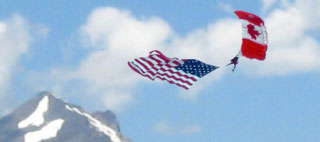Do You Need a Visa When Crossing the Border?
Author: Robert Baird
First Posted: July 23, 2014

Do you need a visa? The short answer for musicians travelling to the US to work is that yes, you do need a visa; for musicians coming to Canada to work the answer is possibly, depending upon your nationality.
Visas that allow a musician to work in the US are: O-1, P-1B, and P-2 (applied for through the AFM) visas, as well as supplementary visas that allow technical and other staff to accompany musicians. The visa process is handled by the US Citizenship and Immigration Services (USCIS) and is a complex process.
Americans entering Canada do not require a visa, so the situation for American musicians is much easier. However, Visitor Visas are required for citizens of certain other countries upon entry into Canada. For musicians working in Canada, a work permit and/or a Labor Market Opinion from Human Resources and Skill Development Canada (HRSDC) may be required, depending on the kind of work being done (more on this later).
Here is a recent letter:
Dear Crossing Borders,
My American group is coming to Canada to perform at a number of festivals in the Maritimes and I need to know if I have to worry about visas. I've heard that it's easy to get into Canada to perform: you just show your Letter of Invitation or your contract to the border officials and you will have no problem getting into the country. I should tell you that my group is made up of performers of different nationalities: American, British and Mexican. What do I need to know? Mixed Bag Player
What you need to know is that, while Canada welcomes citizens of the US and Britain with no visa requirement, your Mexican performer is going to have to get a Visitor (Temporary Resident) Visa from Citizenship and Immigration Canada before he/she will be allowed in. The process is fairly complicated, but it can be done online, and usually takes approximately two weeks.
What is common to all visa applications is the amount of paperwork required. Let's start with the P-2 visa for musicians crossing from Canada into the US to work.
Everyone applying for a P-2 visa must be a member of the AFM (CFM) (except technicians) and everyone must fill out a four- to five-page application. In addition, you must provide a copy of the biometric page from your passport or a copy of your permanent residency card; a signed copy of all contracts for performance in the US; a detailed itinerary, if you are performing at more than one venue; and of course, the required fee to USCIS and an administrative fee to the AFM (CFM). I recommend the P-2 visa because I think it is the best vehicle for dealing with visa requirements in the US.
If you have a situation where you cannot utilize the P-2 visa, then you have the option of applying directly to the USCIS for an O-1 visa (for the individual who possesses "extraordinary ability" in the arts) or the P-1B visa (for members of an entertainment group that has been recognized internationally as outstanding in the discipline for a sustained and substantial period of time).
For both the O-1 and P-1B visas, you need to fill out a complicated application form (to exacting USCIS standards), and supply a consultation letter from a USCIS-designated American labor/nonlabor organization. You will need copies of a signed contract for every performance in the US, along with your passport biographical data page, a complete biography, letters of recommendation from distinguished references, and copies of press reviews to prove recognition of your "extraordinary ability," and of course, the requisite fee. The requirements are daunting and the procedure can be frustrating; USCIS will often return an application if it has not been completed properly or if the support material is insufficient.
As noted above, Americans (and citizens of certain other countries) are allowed to enter Canada without a visa. You can determine if you need a visa at this website. If you need a visa, you will need to fill in an application form, plus provide a letter of invitation from the organization inviting you to perform, a copy of the signed contract, a travel itinerary, and two identification photos, as well as certain other documents, depending upon your nationality. Knowledge of the visa process in both the US and Canada is important to all musicians.
I welcome your questions and concerns. While I cannot answer every question I receive regarding this column, I do promise to answer every e-mail.
Related Websites
This article is reproduced with kind permission by Robert Baird. Please visit the Baird Artist Management website for more information and to contact Mr. Baird.
